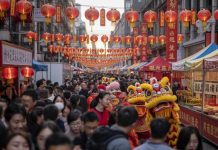Sichuan: Visitors to the Yibin Bamboo Culture Museum in Sichuan province are often amazed by the extensive range of products that can be made from the fast-growing reed.
The museum’s Bamboo as a Substitute for Plastic exhibition area displays an array of bamboo products, from bamboo furniture and handicrafts to bamboo-pulp molded tableware and bamboo-fiber textiles.
Li Bingjie, director of the museum, said bamboo is a perfect alternative to plastics because it is renewable, has a short growth cycle, strong carbon sequestration capacity, and is biodegradable.
“A key mission of our museum is to raise public environmental awareness through popularizing the concept of using bamboo as a plastic alternative,” she said.
Since opening last May, the museum has received more than 50,000 study visits, Li added.
In 2022, the Chinese government and the International Bamboo and Rattan Organization jointly proposed the Bamboo as a Substitute for Plastic Initiative, with the aim of reducing plastic pollution and carbon emissions.
In line with the initiative, Yibin has made developing and producing bamboo-based plastic alternatives a strategic priority for its bamboo industry, said Zheng Renhong, deputy director of the city’s rural work leading group office.
As one of the country’s most bamboo-rich regions, the city has 485 bamboo species and about 222,700 hectares of bamboo forests — that’s enough to cover the small African nation of Comoros. Last year, the comprehensive output value of its bamboo industry reached 42.8 billion yuan ($5.96 billion), Zheng said.
Official statistics show that the city is home to 51 processing companies with a combined annual production capacity of 910,000 metric tons of bamboo-pulp board, paper and molded products. -China Daily





